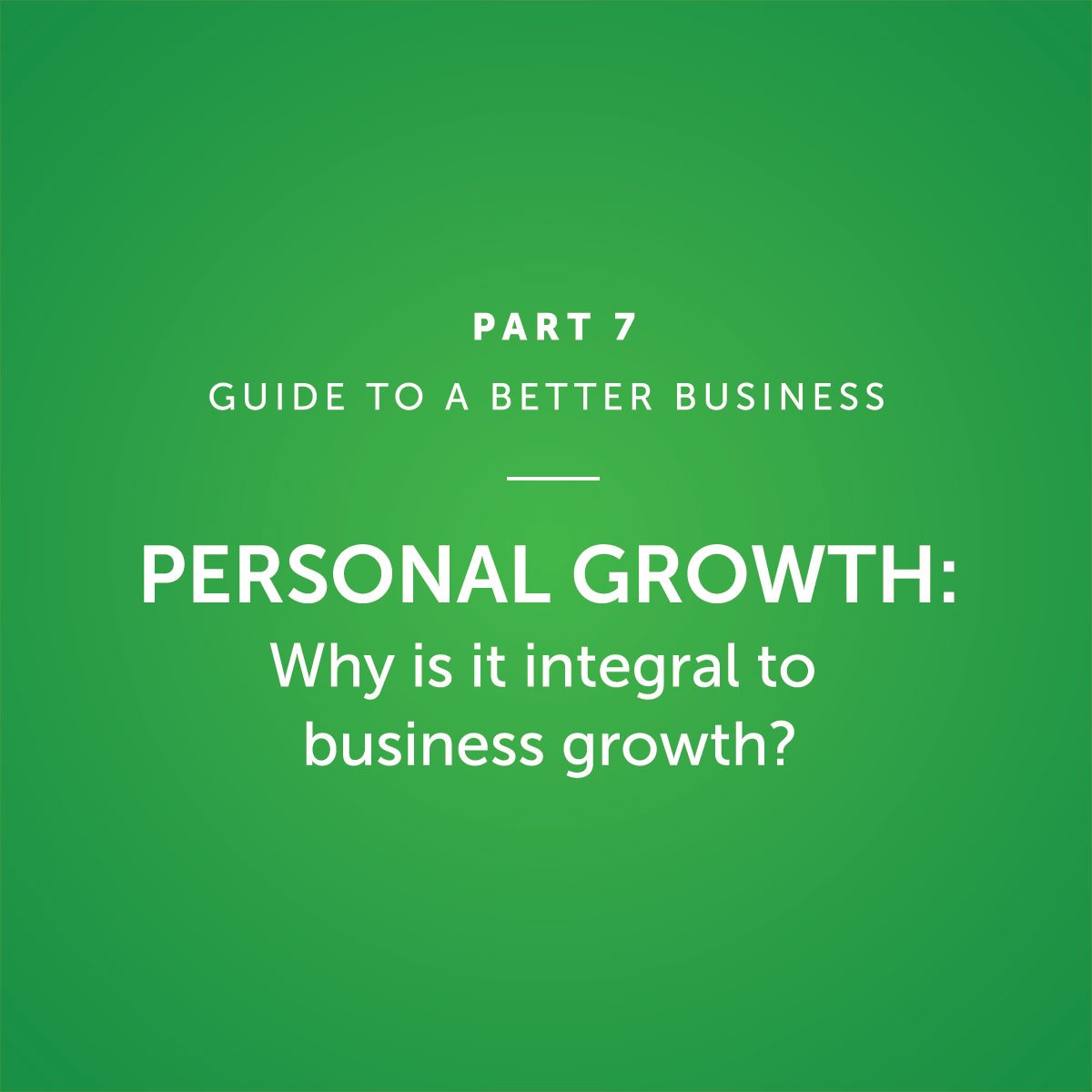PART 7 – GUIDE TO A BETTER BUSINESS
PERSONAL GROWTH:
Why is it integral to business growth?
Why is it integral to business growth?
C
T
I
O
N
Success, Pupose, Freedom, Fulfilment, Peace
The third cornerstone of a successful business is Personal Growth.
Develop yourself and you’ll be in a better position to grow the business in harmony with the direction you want to head in and the type of lifestyle you want.
It’s easy to neglect your personal development
Running a small business is time consuming and requires dedication and constant commitment.
Servicing clients, managing staff and remaining profitable are constant challenges. How do you find the time to improve yourself too?
Unfortunately, self-improvement is often the first to be neglected.
We become like the man feverishly sawing down a tree in Stephen Covey’s book The 7 Habits of Highly Effective People.
“What are you doing?” he’s asked by a passer-by.
“Can’t you see?” comes the impatient reply “I’m sawing down this tree.”
“You look exhausted!” he’s told. “Why don’t you take a break for a few minutes and sharpen that saw? I’m sure it would go a lot faster.”
“I don’t have time to sharpen the saw,” the man says emphatically. “I’m too busy sawing!”

It’s easy to neglect your personal development
Running a small business is time consuming and requires dedication and constant commitment.
Servicing clients, managing staff and remaining profitable are constant challenges. How do you find the time to improve yourself too?
Unfortunately, self-improvement is often the first to be neglected.
We become like the man feverishly sawing down a tree in Stephen Covey’s book The 7 Habits of Highly Effective People.
“What are you doing?” he’s asked by a passer-by.
“Can’t you see?” comes the impatient reply “I’m sawing down this tree.”
“You look exhausted!” he’s told. “Why don’t you take a break for a few minutes and sharpen that saw? I’m sure it would go a lot faster.”
“I don’t have time to sharpen the saw,” the man says emphatically. “I’m too busy sawing!”
Why’s it important to prioritise personal growth?
As a business owner, it’s important to take the time to sharpen your saw: think about what you’re doing, learn new ways and refocus on what’s most important.
If not, you’ll find yourself stuck in the same predictable position, sawing away madly and never really getting anywhere.
Unless you want a business that is simply treading water, why do the same things over and over? Improving yourself will help you improve your results.
Business owners have often received a formal education to get where they are: an apprenticeship, a TAFE or university degree or professional designation.
For many, that’s where their effort to acquire new knowledge ends; and they believe that everything else of importance will be learnt on the job.
Experience is great but it can be so much richer if supported with targeted training.
It’s important to embrace your education and acknowledge the effort you’ve already put in; but this provides a great platform upon which you can acquire the skills you’ll need to grow yourself and your business.
After all, if you already had all the skills needed to achieve your goals, then you would have achieved them all by now.
And anyway, it’s unlikely you’ll measure your success purely on the balance sheet in the business; it will also depend on the lifestyle you’ve achieved and your sense of personal wellbeing.
What skills should you develop and improve?
The sky’s the limit!
In your role as a business owner, you’ll use everything from leadership skills to time-management and negotiation skills; perhaps every day.
You’ll need to “sharpen the saw” in all areas that matter to you.
We’ll help you with the mental development associated with running a business, but Stephen Covey outlines the four core dimensions as:
Physical:
This involves caring for your physical body – eating the right foods, getting enough rest and sleep and exercising on a regular basis.
Social/Emotional:
A life needs meaning and purpose, unlimited by what you achieve through your business.
Contributing to the life of others, living a life of integrity and deeply understanding another human being are all ways that will help you achieve peace of mind and a feeling of security.
Spiritual:
Your spiritual dimension relates very closely to your core values or principles.
It’s a very private area of life and supremely important. You’ll be focusing on the things that uplift you. This might mean meditation, the arts (good books or music), spending time in nature or following a religion.
Mental:
Continually honing and expanding the mind is vital to your success. We’ll provide recommendations for specific resources and focus areas that you might not have previously considered.
Gaining new perspective on subjects can allow you to reframe and handle business issues in ways you never would have thought of otherwise.
This can mean attending more formal education but there are many other ways to develop yourself:
- Books: reading the works of great minds is often the best way to learn new ideas and improve your knowledge. There are countless amazing and engaging books available and we’ve selected the most thought-provoking and practical ones for you to read.
- Videos: It’s incredible that the wisest business minds in the world can make a game-changing speech in some other city or country and we can watch it from the comfort of the couch. We’ve curated a list of videos for you, including TED talks and interviews.
- Podcasts: The perfect way to fill in otherwise dead time; whether you are commuting to work or exercising. There are podcasts covering almost every topic imaginable.
- Trade publications
- Networking: with your target market to learn as much about them as you can.
Always look for opportunities to take yourself out of your comfort zone and experience new things.
How do you make a personal development plan?
Finally, here are a few ideas for creating a personal development plan that can guide you along the way:
- Dedicate time to each of the personal development dimensions. The most successful business owners commit themselves to continuous learning rather than intermittent episodes of intense training.
- Start small – even “stupid small”. In his book Mini-Habits, Stephen Guise explains how he wanted to do 30 minutes of exercise per day but he set the starting goal of just one minute per day! After doing that one minute, he thought it wasn’t so bad, so he did another. Try starting with just one page of a book per day; or two minutes of meditation. The point is…you’ve started.
- Really BELIEVE that you can improve; it’s extremely empowering. If you don’t believe it, you simply won’t achieve it.
- Be intentional with your training. Try to ignore other distractions. If you are reading a good business book, take notes that you can share with others.
- When choosing areas to work on, capitalise on your strengths but don’t neglect your weaknesses as they could be limiting the potency of your strengths.
Remember that a business that cares about the personal development of team members will develop a more engaged workplace; and this leads to improved performance and retention.
Work with your employees to develop their own personal development plans.

How do you make a personal development plan?
Finally, here are a few ideas for creating a personal development plan that can guide you along the way:
- Dedicate time to each of the personal development dimensions. The most successful business owners commit themselves to continuous learning rather than intermittent episodes of intense training.
- Start small – even “stupid small”. In his book Mini-Habits, Stephen Guise explains how he wanted to do 30 minutes of exercise per day but he set the starting goal of just one minute per day! After doing that one minute, he thought it wasn’t so bad, so he did another. Try starting with just one page of a book per day; or two minutes of meditation. The point is…you’ve started.
- Really BELIEVE that you can improve; it’s extremely empowering. If you don’t believe it, you simply won’t achieve it.
- Be intentional with your training. Try to ignore other distractions. If you are reading a good business book, take notes that you can share with others.
- When choosing areas to work on, capitalise on your strengths but don’t neglect your weaknesses as they could be limiting the potency of your strengths.
Remember that a business that cares about the personal development of team members will develop a more engaged workplace; and this leads to improved performance and retention.
Work with your employees to develop their own personal development plans.



Leave A Comment